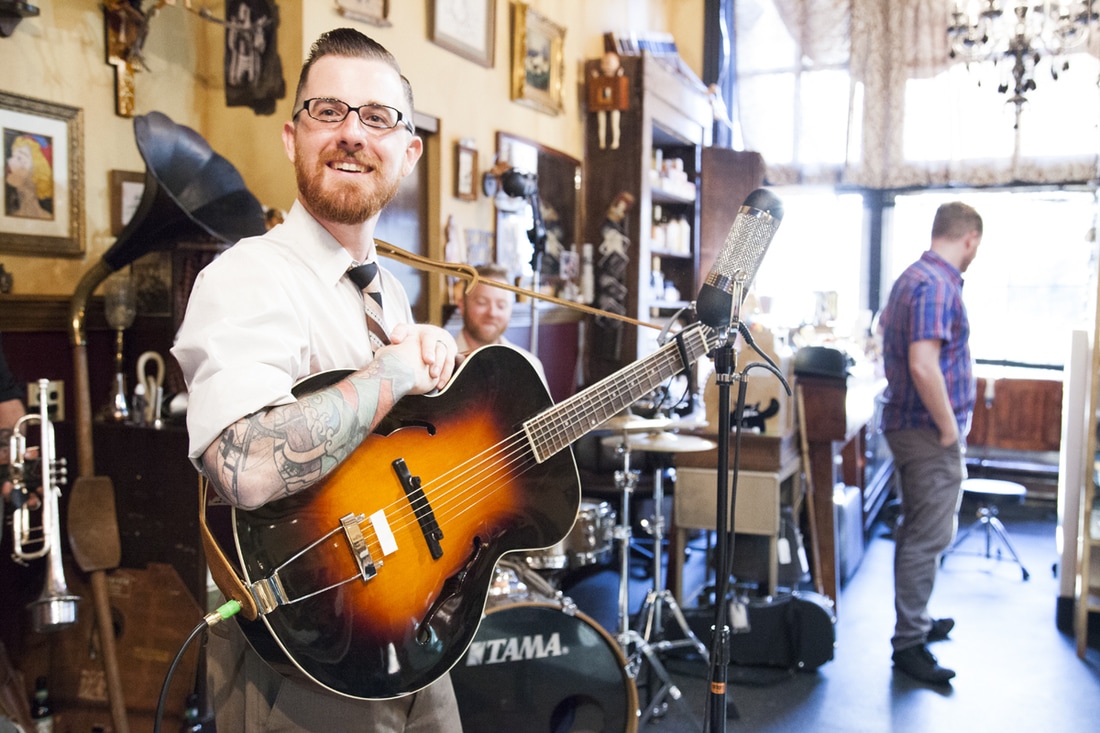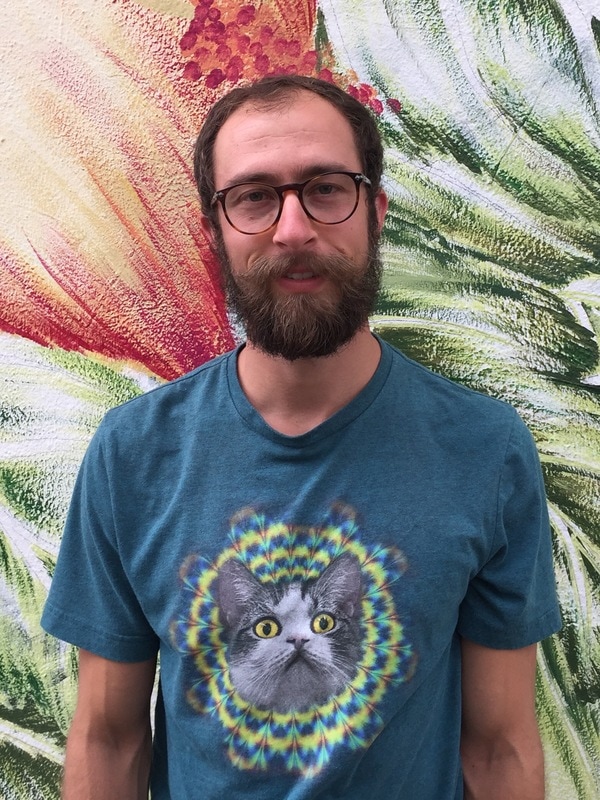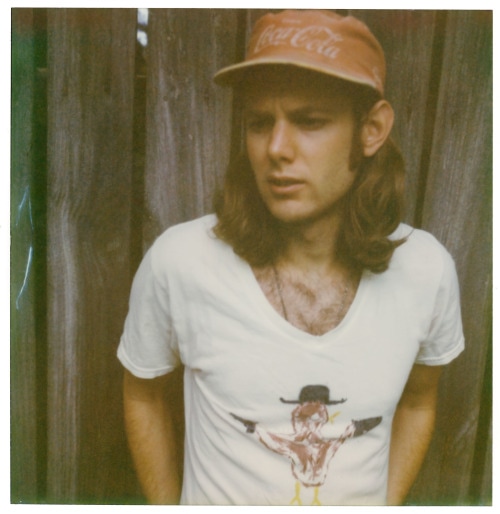|
Photo credit: Shabreon Starks Cortez Garza’s new single “Immortal” off his upcoming album The Low Album features an all star lineup of players including David Kirslis (Cicada Rhythm), Scott Low, songwriter Kaitlyn Bosveil, Matt Tamison (Flash to Bang Time), Cal Clements, and Bill Bacon (Sam Sniper). But central to the song is Cortez’s vivid narrative and trademark plainspoken songwriting style. “Immortal” is a lush song that depicts its subjects character flaws with extreme detail—listen to how Cortez blends the declarative chorus of “I won’t let you down” with Cal Clements mournful horns to a make song that’s in the beautiful space between redemption and complete devastation.
The best part? It’s available now as a free download on his Bandcamp page. SC: This song has a very cyclical chord progression. How do you view repetition working in this song? CG: As a solo artist, my approach to writing has always usually revolved around guitar licks, whether it be folksy or bluegrassy. My biggest influences are people like Woody Guthrie and Rambling Jack Eliot and of course Bob Dylan. For this song—and really for this album—I wanted to dumb down the guitar and focus on telling stories. I always try and make every song I write as unique as possible. In a lot of ways this may be the simplest guitar riff I've ever used in a song. That being said, it may be my favorite recording I've done yet (which was something I did not expect) or at least at the moment it is, which is why we decided to use it for the 1st single, that and because I think people associate me with dark material and this song is very middle of the road for me and I was intentionally reaching for something that would showcase some maturation in my writing. SC: In the first verse the song speaker sings “I’ve let you down / you deserve the best / and that’s not what I give” but the chorus is “I won’t let you down”. I wonder if you could tell me how you view these tensions working in the song. CG: This song is about someone coming to terms with the fear of chasing away someone they love, or better yet realizing they are not carrying their weight in the relationship, so to speak. Again for me, sort of new territory because I went with a very simple approach lyrically, where as before I was hesitant to come right out and say how I was feeling. So the verses are very much saying "hey I realize I'm not easy to deal with but here's why" and the chorus is sort of pleading for her to hang in there I guess. SC: What was your writing process like for “Immortal”? CG: Oh man—I wrote this a few years ago at this point but I remember it well. It's sort of like having a baby or something I guess, in that no matter how much time goes by I always remember most of the details of working on what I consider to be an important song. Like I said before, I would have never thought this song would have been so important when I sat down to write it but sometimes things just take on a life of their in the studio. This song came together quickly and I didn't really care for it. It started out as a sort of a writing exercise. I remember writing it in like 15-20 minutes with minimal edits after the fact. I literally just tried to come up with the most unique but simple chord structure I could so I could say what I had to say and be done. When performing this song solo, given it's simplistic nature, it never really did it for me. I actually thought for a long time I had written a bad song but for some reason it just keep popping back up in my set. SC: Tell me about your normal writing process. Do you keep a songwriting schedule? Or do you wait for inspiration? CG: Lately I have tried to maintain some sort of routine with writing. The thing is writing a song that you really love is a very unpredictable affair. It's definitely like lightning striking so I don't put that much pressure on myself. Obviously there are times when I feel this unbearable weight on me and I have to get it off my chest. I just try to constantly be working towards new material. From finding new riffs and chord progressions to jotting down lyrics. For me there's no rhyme or reason to it. It really depends on what type of song I'm trying to come up with. Any time I write something new that I like and want to perform live, I feel truly blessed. Whether it came easily or it was a struggle and I had to work at it. SC: How does your songwriter community influence your work? CG: Athens, GA is a great place to be for a musician of any variety. This community is unique in so many ways and I think for me to live somewhere that puts such a emphasis on it's musical culture is just about as cool as you can get. For instance, they recently started a new singer-songwriter of the year awards ceremony that was named after the legendary, Vic Chesnutt. I mean what else is there to say . . . this is what I do. It's almost easy to take for granted because I have lived here for so long that I don't know anything else. I have to remind myself that not every town is like this.
0 Comments
Caleb & The Gents' music incorporates all the hallmarks of a good jugband; banjo, kazoos, archtop guitar, washboard bass lines, and rowdy group choruses. With its tin-pan two step backbeat, “All That Money” spins a tale any musician can relate to; there’s a whole lot of money in the world, and none of it is yours. The Gents weave an intricate and controlled palette that allows each member to shine through the mix like silver dollars. And that’s the heart of what’s remarkable about this song: it is meticulously orchestrated and extremely streamlined. You can buy a copy of The River EP here. SC: How do you see the 1920s rhythms and textures of western swing relating to contemporary life? CW: Plenty of ways! It all depends on how you look at it or listen to it. I feel like a lot of times, the instrumentation maybe isn't always more simple than other styles of music, but it's very centered around feeling the song out and playing what the piece calls for. The rhythm is also very, very consistent. Like a heartbeat, or the sound of a train coming down some old railroad tracks, or the rhythm of a hammer driving a nail into a piece of lumber. SC: I love the vivid details and bitter irony in this song. For example in the second verse “It’s the same thing every day / I’m working hard just like i should / boss man wrote me a check / said you take that to the bank / you know that check ain’t no good,” I’m wondering if you could share some of the inspiration behind that verse.
stretch and the boss telling me that he didn't know if he could pay me for the work. I wrote that line the next morning, drinking my coffee before work.
SC: What was your writing process like for "All That Money"? CW: It was a slow-going process that I drug out over quite a few months, but when it clicked, the song just came together and was complete in the matter of three or four days. I wrote (a rough version) of the chorus while I was driving one day, with no music. Just an idea that I thought it would be sort of humorous to write about how broke I was at the time. It didn't come from a sad place. I didn't have a "woe-is-me" approach to it. I just thought that everybody, at some point, had been where I was at that moment, if not in a worse way, and so it seemed like everyone could relate to laughing about how little money they had. Then, I went through months of not really adding anything to that chorus until I stumbled into the chord progression one night. After that, the verses and the final version of the chorus just spilled out over the course of a few days. SC: Tell me about your normal writing process. Do you keep a songwriting schedule? Or do you wait for inspiration? CW: I don't necessarily have a process, although I probably should. I play my guitar or my banjo every day and I practice new styles of playing, new chord voicings, new scales, and things like that. I'm always looking for the next chord progression that is going to make me feel like it needs to be a song. I write all the time, but not always music. I write in the car, in the shower, at work, when I'm watching a movie, I get up in the middle of the night to write things down. I write songs, thoughts that might turn into songs later, short stories, or might sit down and describe in the most vivid detail I can, a scene that I can recall in my head. All that to say, I think it's damn near impossible for me to not be creating something. More often than not, I feel like I'm wasting time if I'm not being at least somewhat creative. SC: How does your community of songwriters influence your work? CW: All the folks I'm lucky enough to be musically involved with are incredibly talented and I think more than anything, it makes me want to continually improve. Not that I'm unsatisfied with the music I write, or the lyrics in the songs, but I don't think there will ever be a point where I say, "Well, that's it. That's the best I can do," and I owe that largely to that group of folks who are continually pushing me to do better. As a community, if we all keep working harder to make better and better music, and to grow our craft and our trade, then that is going to make this community stronger as a whole. Julian Morena’s “Garden” is a meditation on life, loss, and yearning. “Garden” is an innovative mix of Ben Gibbard’s vocals with a primo lounge record from the early 80s, and a little something else that makes it extra special. Is it the counterpoint of a synthesizer? Is it the wispy guitars? Perhaps the saxophone solo the song culminates in? Whatever is at work here, you can be certain it is 100% Julian Morena’s bottled magic.
You can get a copy of Kind of Nice here (out 5/13/17) SC: “Garden” has a dramatic difference in the musical dynamics between chorus/verse. How do you see that reflected in the song’s lyrics? JM: The lyrics during the verses are full of words that paint a grayscale mental picture: 'shadows' 'disguise' 'pavement'. The lyrics go with the subdued, mysterious palate of the music of the verses. Then during the pop of the choruses, the language becomes more colorful and animated: 'garden' 'live' 'feel'. These are freeing words when compared to the constraints of disguises and pavement, so they follow the more open, groovier, and louder feel of the chorus. They also provide a release from the odd tension of the verses' words and chords. SC: Tell me about the choice of instrumentation in “Garden”. The pairing of synthesizer of acoustic guitar in addition to the closing saxophone coda. How do you see these working in the song? JM: I think these elements work as nice surprises in the song. I don't like feeling constrained by a palate of instruments that are 'supposed' to be used in a genre of music. When the listener hears the intro 'oohs' with the acoustic guitar, I don't think that they're expecting the synthesizer to jump in at the chorus, but I think that after the surprise, the synth works well for the groove of the song. It also adds a thematic layer to the music as an antithesis to the lyrics. I'm singing 'I would love to start a garden, could easily live off of the land' all the while this electronic droning is going on. The bridge is another surprise moment, as the song goes from the spacey chorus to a type of funk breakdown, and that's where the sax appears for the first time. Again, it's unexpected, but I think that sax solo is perfect for the song; it's funky and freeing and drives home the lyrical message. Plus, who doesn't love horns? The surprise factor of the instrumentation in the song is nice, but all of the elements had to serve the message of the song, and I think we were able to do that on this track. SC: What was your writing process like for “Garden”? JM: This is one of those songs that happened by accident. I was messing around on my guitar one night, and I accidentally played an E major chord a fret higher than it's supposed to be. Upon fixing the mistake and playing the E major in its rightful spot, I liked the way the two chords sounded together. Those two chords, along with an added A minor, became the chords for the verses. The subdued, spooky feel of those chords just lent themselves to the gloomy lyrics of insignificance or boredom. I think I was in a phase of my songwriting where I was trying to write happier sounding songs, so that's where the feel of the chorus came from. This is one of the oldest songs on 'Kind of Nice', and it's unique in that it doesn't have a clear narrative. Storytelling songs are much more common for me. Keeping the lyrics a little vague was something I started enjoying around this time, and I ended up using that device of subtlety and intimation a lot on the rest of the album as well. SC: What is your writing process like? Do you keep a schedule? Or do you wait for inspiration? JM: I don't keep a strict writing schedule, but I know that the more I sit down with my guitar, the more songs I write, so I try to do that as much as possible. Usually a line of lyrics or a melody will pop into my head at an inopportune time of day or night. I'll write or record the line on my phone and then flesh it out later when I have time to sit with a guitar. I usually have to strum and sing simultaneously to get anything done. I wrote most of the songs on 'Kind of Nice' while I was on an overnight stint at work. My sleep schedule was opposite of the rest of the world's, so on my nights off I'd stay up until 7am playing guitar and writing songs. That shift was hell on my personal life, but great for my songwriting. I wouldn't recommend it though. SC: How does your community of songwriters influence you? JM: They inspire me to write more, that's for sure. I go to as many open mics as possible, so I'm surrounded by people who are constantly churning out songs week by week. I'm far from a prolific writer, so I'm always impressed by that ability. They've also influenced me by challenging me to be unique. So many of them are such incredible musicians and/or singers, I quickly learned that I'd never stand out in those regards. Instead, they showed me how important it is for a songwriter to inject some personal, unique aspect of themselves in their work. That realization is where my lines like 'Capoeira Cara pisses in her shower where the disco light's installed...' and 'Down near her ribs, there's a younger version of Anastasia who doesn't purse her lips or hate us for having fun...' came from. I know those lines couldn't have been written by anyone else because they are based on very specific people, relationships, and experiences in my life. Yet they're still accessible and attention grabbing (I hope). Slow Parade blends layered guitar feedback trills with impeccable songwriting. The end result often feels like putting spurs on your moonboots. “Jackpot” is a world-weary confession and a love letter for the end of days. As the song crackles with a pedal steel lead singer Matthew Pendrick sings “we’re just taking up space / on this melting time capsule / which may soon be erased” but despite the bleakness of this sentiment Pendrick’s earnest croon assures us to “honk the car horn / when you pass by my place / so I know your heart’s beating / I hope it’s keeping good time.” We hope you’re keeping good time, too, Slow Parade. Slow Parade is currently working on a follow up to their last record Big Plans. You can pick up a copy of Big Plans here. SC: I love this song because it sounds like one of these letters never sent to a friend. Do you feel there is a relationship between songwriting and letter writing? MP: I don't write as many letters as I'd like to, or songs really, but I do like the reflection that they both allow. Giving yourself time to pick through your thoughts explore what the hells happening up there before you make a statement
MP: Can't say it's very intentional honestly . I guess you got to give yourself a minute to catch a breath. and make some awkward eye contact with someone in the audience
SC: What was your writing process like for "Jackpot" MP: I wrote this song while on a solo camping trip in Providence Canyon. It tumbled out after breakfast the first morning, pretty quickly. I could tell early on it was going to get heavy but thankfully I forced myself to finish it out. As the smoke is clearing a Ranger showed up and told me there would be a storm and then gave me an orange soda. That night a tornado ripped through the park, but I was hard fast to sleep thanks to my box of wine. SC: What is your writing process like? Do you keep a schedule, or wait to be inspired? MP: Wish I could say I was writing on schedule, or that that worked well for me, but the songs i've written that appeal to me in the long run tend to be the ones that happen in a quick burst of inspiration. If I've learned anything since I started writing songs—and I still have to repeat this to myself constantly—it is that you have to chase that inspiration down and pin it to the ground when it shows up. It will never be there in the same way later. SC: How does your community of songwriters influence your work? MP: Well I stole part of the melody of "Jackpot" from Ethan Fogus' song "Southbound". Which is to say: Big league. Huge . My friends are a constant source of inspiration. I wouldn't be playing music without them. |
The Sound Connector is an online magazine for songwriters. We feature songwriting challenges, monthly interviews, and the opportunity to discover new songwriters. We are interested in all things related to the craft of songwriting. Do you want to be featured on The Sound Connector? Send us your songs!
Categories |




 RSS Feed
RSS Feed